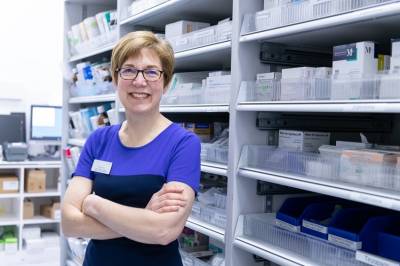Opinion: COVID-19 vaccines – are they safe, or have they been rushed?
17 December 2020
Professor Bryony Dean Franklin, Professor of Medication Safety, shares her thoughts on the latest vaccine developments.
Over the last few weeks, COVID-19 vaccines have been a hot topic - in the mainstream media, on social media, and in our day to day conversations. Many of my friends and colleagues have asked for my views – both as a pharmacist and as a Professor of Medication Safety here at UCL.
Have the vaccines been developed and tested properly, or have they been rushed? Are they safe? Should they have the vaccine? And am I going to have it? Here are my answers to each of these questions.

First, I hear various concerns being aired that the vaccines have been ‘rushed’. It’s certainly true that the vaccines have been developed, tested and approved at a very rapid rate. Many researchers working on other vaccines and other clinical trials refocused their efforts to work entirely on COVID-19. So in that sense, yes the vaccines have been ‘rushed’, due to urgent clinical need. But this does not mean speed at the expense of quality or safety. The vaccines have been tested in huge numbers of people according to clinical trials best practice.
For example, the first vaccine to be authorised for use in the UK, the Pfizer BioNTech vaccine, has already been administered to more than 18,800 participants in an ongoing randomized, placebo-controlled international study, with a similar number of participants receiving a saline placebo. Participants have already been followed up for an average of two months after receiving their second dose and all outcomes will have been carefully documented.
Regulators such as the UK’s Medicines and Healthcare products Regulatory Agency and the US Food and Drugs Administration have then been through this data carefully to verify the vaccine’s safety before authorising its use.
Second, are they safe? It’s fair to say that nothing is 100% safe – exercising, drinking alcohol, travelling by car or bike, even walking down the pavement. And medicines and vaccines are the same. Like all medicines and vaccines, these vaccines can cause side effects. Most are mild and short-term, and not everyone gets them. For example, in the trial of the Pfizer BioNTech vaccine, the most common side-effects were pain at the injection site, tiredness, headache, muscle pain, chills, joint pain, and fever.
For people who had these side-effects, they typically lasted several days and were more common after the second dose rather than the first. There were also more recent reports of allergic reactions in two NHS staff, both of whom had a previous history of very severe allergic reactions, and are now recovering well.
Third, should you, and my family and friends, have the vaccine? For the vast majority of you, I will say a definite “yes”! The exceptions would be if you have a history of severe allergy – for example, if you have ever had an anaphylactic reaction, or if you carry an adrenaline auto-injector, then it may not be appropriate for you.
If you are pregnant or breastfeeding, then the advice at the moment is that you should also wait before having the vaccine. And if you aren’t sure, do your research – don’t rely on social media or other potential sources of misinformation - the NHS website has some useful and balanced information. If you have further concerns or questions, ask a health care professional so that you can explore your concerns together.
Finally, am I going to have it? Yes, without a doubt. I’ve had COVID-19, and luckily it was a very mild infection. But I still don’t want to have it again – I may not be so fortunate next time. And even more importantly, I don’t want to inadvertently spread it to my patients, my colleagues, my students, my friends and neighbours, or my parents who due to their age are likely to have worse outcomes. I’ve already put myself on the waiting list at the NHS Trust I work at, along with 3,000 other members of staff at the last count, and am awaiting details of how to book an appointment.
Further information:
- Professor Bryony Dean Franklin staff profile
- New co-Editor-in-Chief for top quality and safety journal
- Patients should carry information about their medicines
 Close
Close

